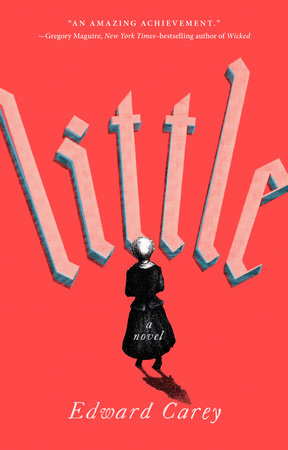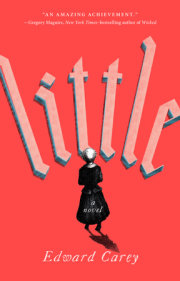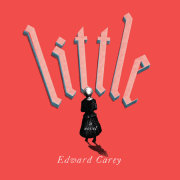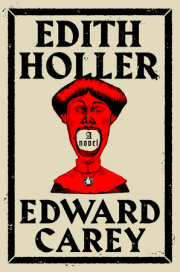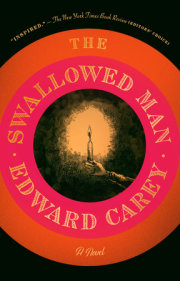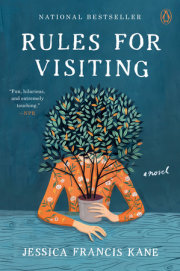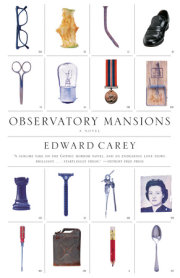In which I am born and in which I describe my mother and father.
In the same year that the five-year-old Wolfgang Amadeus Mozart wrote his Minuet for Harpsichord, in the precise year when the British captured Pondicherry in India from the French, in the exact year in which the melody for "Twinkle, Twinkle, Little Star" was first published, in that very year, which is to say 1761, whilst in the city of Paris people at their salons told tales of beasts in castles and men with blue beards and beauties that would not wake and cats in boots and slippers made of glass and youngest children with tufts in their hair and daughters wrapped in donkey skin, and whilst in London people at their clubs discussed the coronation of King George III and Queen Charlotte: many miles away from all this activity, in a small village in Alsace, in the presence of a ruddy midwife, two village maids, and a terrified mother, was born a certain undersized baby.
Anne Marie Grosholtz was the name given to that hurriedly christened child, though I would be referred to simply as Marie. I was not much bigger, at first, than the size of my mother's little hands put together, and I was not expected to live very long. And yet, after I survived my first night, I went on, despite contrary predictions, to breathe through my first week. After that my heart still kept time, without interruption, throughout my first month. Pigheaded, pocket-sized thing.
My lonely mother was eighteen years old at my birth, a small woman, a little under five foot, marked by being the daughter of a priest. This priest, my grandfather, made a widower by smallpox, had been a very strict man, a fury in black cloth, who never let his daughter out of his sight. After he died, my mother's life changed. Mother began to meet people, villagers who called upon her, and among them was a soldier. This soldier, a bachelor somewhat beyond the customary age, possessing a somber temperament brought on by witnessing so many appalling things and losing so many soldier friends, took a fancy to Mother; he thought they could be happy, so to speak, being sad together. Her name was Anna-Maria Waltner. His name was Joseph Georg Grosholtz. They were married. My mother and my father. Here was loving and here was joy.
My mother had a large nose, in the Roman style. My father, I believe, had a strong chin that pointed a little upward. That chin and that nose, it seems, fitted together. After a little while, however, Father's furlough was over, and he returned to war. Mother's nose and Father's chin had known each other for three weeks.
To begin with, for always, there was love. The love my father and mother had for each other was forever present on my face. I was born with both the Waltner nose and the Grosholtz chin. Each attribute was a noteworthy thing on its own, and nicely gave character to the faces of those two families; combined, the result was a little ungainly, as if I were showing more flesh than was my personal due. Children will grow how they will. Some distinguish themselves as prodigies of hair growth, or cut teeth at a wonderfully young age; some are freckled all over; others arrive so pale that their white nakedness is a shock to all who witness it. I nosed and chinned my way into life. I was, certainly, unaware then of what extraordinary bodies I should come to know, of what vast buildings I would inhabit, of what bloody events I would find myself trapped within, and yet, it seems to me, my nose and my chin already had some inkling of it all. Nose and chin, such an armor for life. Nose and chin, such companions.
Since girls of my stamp were not schooled, it was Mother who gave me education through God. The Bible was my primer. Elsewise, I fetched in logs, looked for kindling in the woods, washed plates and clothes, cut vegetables, fetched meat. I swept. I cleaned. I carried. I was always busy. Mother taught me industry. If my mother was busy, she was happy; it was when she stopped that uncertainty caught up with her, only to be dispelled by some new activity. She was constantly in motion, and movement suited her well.
"Discover," she would say, "what you can do. You'll always find something. One day your father will return, and he'll see what a good and useful child you are."
"Thank you, Mother. I shall be most useful, I do wish it."
"What a creature you are!"
"Am I? A creature?"
"Yes, my own little creature."
Mother brushed my hair with extraordinary vigor. Sometimes she touched my cheek or patted my bonnet. She was probably not very beautiful, but I thought her so. She had a small mole just beneath one of her eyelids. I wish I could remember her smile. I do know she had one.
By the age of five I had grown to the height of the old dog in the house next to ours. Later I would be the height of doorknobs, which I liked to rub. Later still, and here I would stop, I would be the height of many people's hearts. Women observing me in the village were sometimes heard to mutter, as they kissed me, "Finding a husband will not be easy."
On my fifth birthday, my dear mother gave me a doll. This was Marta. I named her myself. I knew her little body, about a sixth the size of my own; I learned it entirely as I moved it about, sometimes roughly, sometimes with great tenderness. She came to me naked and without a face. She was a collection of seven wooden pegs, which could be assembled in a certain order to roughly resemble the human figure. Marta, save my mother, was my first intimate connection with the world; I was never without her. We were happy together: Mother, Marta, and me.
Copyright © 2018 by Edward Carey. All rights reserved. No part of this excerpt may be reproduced or reprinted without permission in writing from the publisher.

